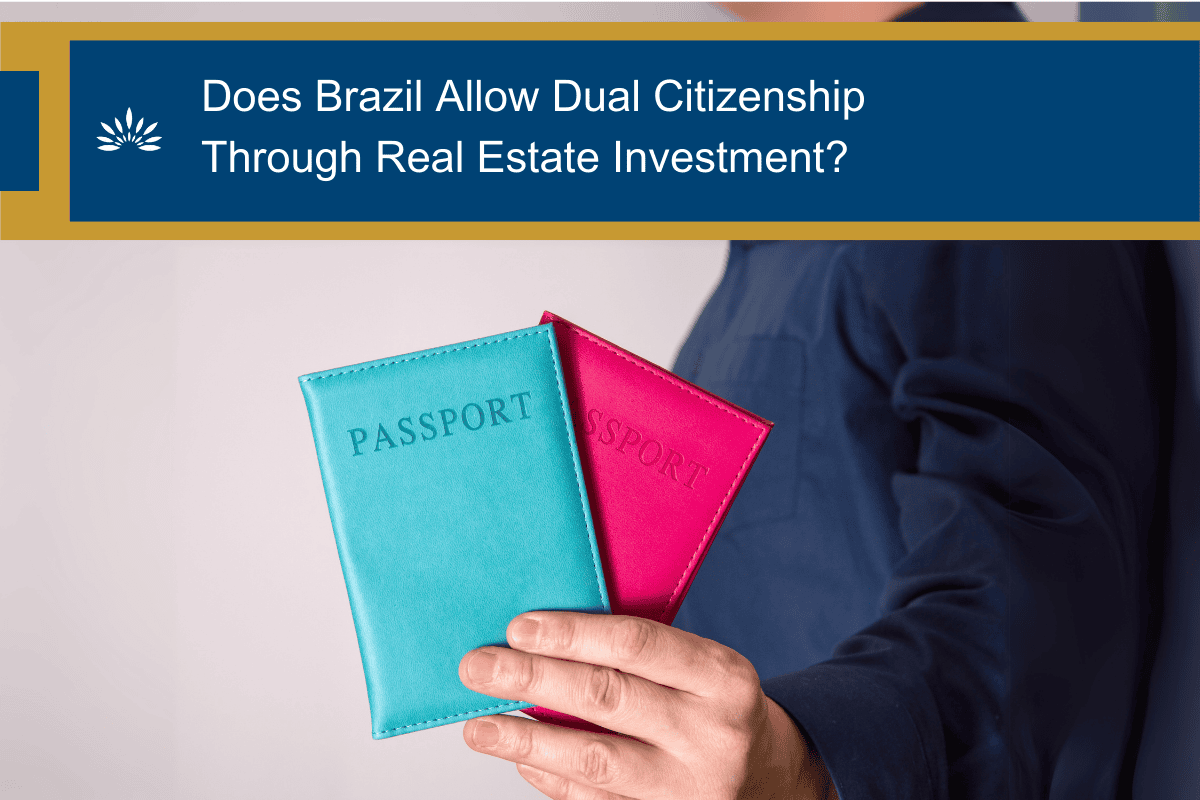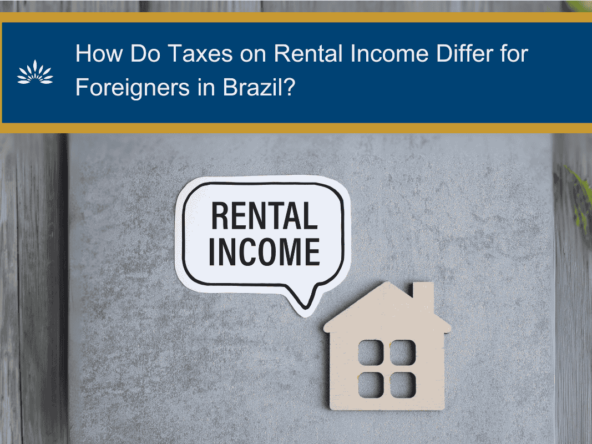Wondering If Dual Citizenship in Brazil Is Possible?
Buying property in a foreign country can feel overwhelming—especially if you hope it might lead to a second passport. In this article, we cut through the rumors and unpack how real estate in Brazil could support your dream of dual citizenship, without sacrificing your original nationality.
Lucas and Sofia’s Story

If you’ve had similar thoughts, you’re in good company. Many prospective investors around the world ponder how to obtain dual citizenship when they discover the vibrant and often lucrative possibilities of brazil real estate investment. Whether your focus is on commercial real estate in São Paulo or a serene vacation home on the coast, you might wonder if there’s a pathway from real estate development or ownership to a second passport.
In this guide, we’ll unravel the truth behind the connection between real estate agents in Brazil, foreign property investment, and eventually securing that coveted dual citizenship in Brazil. We’ll also discuss various types of real estate you can explore, the benefits of dual citizenship, and the key legal steps to keep your plan on track. By the end, you’ll have a clearer picture of whether Brazilian real estate can help you cross the finish line toward a second nationality.
The Allure of Brazil Real Estate Investment
Brazil has long been a magnet for international buyers. Some are drawn by the country’s year-round warm weather and stunning beaches, while others see a chance to grow their wealth by tapping into commercial real estate or promising development projects. Cities like São Paulo, Rio de Janeiro, and Brasília often capture the spotlight due to strong infrastructure, bustling economies, and vibrant cultural scenes. Meanwhile, the Northeast region, featuring states such as Bahia and Pernambuco, offers a more laid-back, coastal vibe at potentially lower property prices.
While brazil real estate investment can yield solid returns over time, many investors wonder if it also grants the right to long-term residency—or even better, direct citizenship. To clarify, Brazil does not maintain a “purchase a house, get a passport” policy. However, strategically incorporating property investment into a broader immigration plan can support a successful residency (and eventually naturalization) application.
Looking for Expert Guidance? Let Us Help!
[email protected]
+55 (21) 4042-0633
+1-214-438-3777
Does Brazil Allow Dual Citizenship?
A pivotal question for many foreigners is: does Brazil allow dual citizenship if I later decide to naturalize? The good news is yes. Brazil generally recognizes dual nationality. You can become Brazilian without necessarily renouncing your original passport—provided your home country also permits it. Understanding this aspect can be a major relief for individuals who wish to retain the rights and privileges from their birth country while also enjoying the benefits of dual citizenship in Brazil.
However, the key is that property ownership alone won’t instantly make you a citizen. You’ll need to follow the official steps, typically involving:
- Acquiring a visa or residency permit
- Living in Brazil for the legally mandated period
- Demonstrating Portuguese language proficiency
- Passing any moral or criminal background checks
- Filing a naturalization request
So, while real estate in Brazil can be a central pillar of your plan, you must also fulfill all the typical residency prerequisites before you can apply for a second passport.
Pro Tip: If your long-term goal is dual citizenship, start building your language skills early. Even casual Portuguese lessons can make a big difference when it’s time for the formal naturalization exam.
How to Obtain Dual Citizenship Through Investment: The Basics
Even though there isn’t a direct “Golden Visa” program for brazil real estate investment, foreigners can pursue other visa categories that may eventually lead to dual citizenship in Brazil. Below are some potential routes:
1. Investor Visa (VIPER)
The “VIPER” investor visa is for foreign nationals willing to inject significant capital into a Brazilian business. While owning brazilian real estate alone may not suffice, you could structure your real estate development project as an operational business that creates jobs. For instance, if you develop a small condominium complex or a boutique hotel that employs local workers, you might qualify for an investor visa.
Once you’ve secured the investor visa, you typically must meet residence requirements—like maintaining a minimum physical presence in Brazil every year. After fulfilling these obligations for the statutory period (often four years, though this can vary), you become eligible to apply for naturalization.
2. Entrepreneur Visa
Alternatively, consider an entrepreneur visa, which might be more flexible than the investor visa for some. If you plan to open a Brazilian company that handles commercial real estate, property management, or development, you could use this business to justify your presence. The catch is ensuring that your venture meets the job creation criteria, capital injection thresholds, and compliance regulations set by the government.
3. Other Special Visas
Depending on your profile, there may be specialized visas—for retirees, researchers, high-level executives, or individuals married to Brazilians. Although these aren’t specifically tied to property investment, owning real estate can still demonstrate your commitment to Brazil, strengthening your residency applications.
Exploring Various Types of Real Estate in Brazil
Brazil’s real estate landscape is incredibly diverse. Before you set your sights on how to obtain dual citizenship through an investor or entrepreneur visa, consider which types of real estate align with your goals.
Residential Properties
Condos and apartments in major cities like São Paulo, Rio de Janeiro, or Brasília
Houses in suburban or coastal neighborhoods
Vacation homes in popular tourist destinations, especially in the Northeast
Commercial Real Estate
Office buildings or co-working spaces
Retail stores, restaurants, or shopping complexes
Industrial warehouses for logistics or manufacturing
Mixed-Use Developments
Projects that blend residential, retail, and office spaces within the same complex,
potentially generating multiple income streams
Real Estate Development Projects
Purchasing land to construct apartments, hotels, or commercial centers
Renovating existing structures in historic districts
Agricultural or Rural Land
Farmland for livestock, crops, or eco-tourism ventures. Note that rural and border area purchases
can have special restrictions for foreigners.
By choosing the right segment and location, you can increase your property investment returns and potentially demonstrate to immigration authorities that your economic contributions are substantial and ongoing. This strategy can bolster any residency or investor visa application.
Looking for Expert Guidance? Let Us Help!
[email protected]
+55 (21) 4042-0633
+1-214-438-3777
Key Steps: From Property Investment to Residency
Let’s piece together the puzzle of using brazil real estate investment to facilitate a longer-term presence in the country. The process typically looks like this:
- Research and Market Analysis: Explore local property values, rental yields, and emerging neighborhoods.
- Legal Consultation and Structuring: Contact a law firm such as OliveiraLawyers.com to understand your legal options and ensure compliance.
- Execute Your Brazil Real Estate Investment: Obtain a CPF, finalize contracts, pay taxes (ITBI, notary fees), and record the sale in the local property registry.
- Apply for an Investor or Entrepreneur Visa: Submit documentation showing your capital investment and how it benefits Brazil’s economy.
- Maintain Residency: Track the minimum time you must stay in Brazil each year, plus any business or reporting obligations.
- Transition to Permanent Residency and Naturalization: After the required years of residency, meet language and moral-fitness criteria to apply for citizenship.
The Benefits of Dual Citizenship in Brazil
If you’re wondering why to go through all the hurdles of property ownership, visas, and language exams, consider the benefits of dual citizenship in Brazil:
- Freedom to Live and Work: No more visa renewals; reside indefinitely anywhere in the country.
- Political Participation: Brazilian citizens can vote, influencing the direction of local and national policies.
- Enhanced Travel Options: Enjoy visa-free or visa-on-arrival access to many countries worldwide.
- Business and Investment Incentives: Fewer restrictions on rural property ownership and business formation.
- Cultural and Social Integration: Full immersion into Brazil’s vibrant communities, traditions, and festivals.
Beyond these personal perks, dual citizenship in brazil can also expand your children’s horizons if you plan to raise a family there. They’d be eligible for Brazilian nationality from birth, potentially giving them a lifetime of global opportunities.
Spotlight on Prime Markets
In major cities like São Paulo, commercial real estate offers compelling opportunities for foreign investors aiming to combine profitable ventures with long-term residency plans. São Paulo is Brazil’s financial hub, brimming with multinational corporations, tech startups, and a growing need for quality office spaces.
Meanwhile, the alluring beaches of Rio de Janeiro entice many to build or renovate boutique hotels or vacation rentals—especially near hotspots like Copacabana or Ipanema. If you design a unique hospitality concept, employ local staff, and attract international tourists, you may strengthen your case for permanent residency down the road.
Even outside these bustling metros, there are budding opportunities:
- Salvador: Rich in culture and receiving more tourists each year, especially during Carnival.
- Fortaleza: Offers growing beach tourism, making short-term rentals a viable plan.
- Brasília: The nation’s administrative capital, with steady demand from diplomats and government workers.
Looking for Expert Guidance? Let Us Help!
[email protected]
+55 (21) 4042-0633
+1-214-438-3777
The Importance of Real Estate Agents in Brazil
Hiring the right real estate agents in Brazil can make or break your property purchase or development project. Seasoned agents understand:
- Local Market Trends: Insights on up-and-coming neighborhoods, undervalued developments, and potential zoning changes.
- Property Valuation: Avoid overpaying or investing in stagnant areas.
- Legal & Bureaucratic Hurdles: Coordination with lawyers, notaries, and utility companies, which can be especially valuable for non-Portuguese speakers.
An experienced agent acts like your on-the-ground resource, introducing you to reputable developers, architects, and financial institutions. This support is vital if you’re not yet residing full-time in Brazil but wish to establish a profitable, visa-friendly real estate venture.
Potential Pitfalls and How to Avoid Them
Like any major international investment, buying brazilian real estate comes with risks. You’ll want to sidestep these common pitfalls:
- Incomplete Due Diligence: Always verify ownership, outstanding taxes, and local zoning.
- Overlooking Cultural Nuances: Business in Brazil can be relationship-driven, so building rapport is crucial.
- Ignoring Residency Requirements: You can lose your investor visa if you don’t spend enough time in Brazil each year.
- Language Barriers: Portuguese is the official language; hiring translators or learning basics is essential.
- Poor Financial Planning: Factor in property taxes, maintenance, capital gains, and cross-border tax implications.
By anticipating these challenges and addressing them promptly, you can protect your finances and maintain compliance with Brazilian law—keeping your path to dual citizenship in Brazil alive and well.
Real Examples: Real Estate Development Leading to Residency
Boutique Hotel in Bahia
Margaret, a tourism enthusiast from Canada, fell in love with Bahia’s stunning beaches and cultural festivals.
She partnered with local architects to renovate a historic colonial property into a boutique hotel.
This real estate development project employed around 15 Brazilian workers. Over time, Margaret’s continuous investment
and job creation helped her secure a long-term investor visa. After maintaining her residency and learning basic Portuguese,
she began the process of applying for naturalization.
Office Complex in São Paulo
David, an American entrepreneur, identified a gap in the market for affordable, modern office space in São Paulo’s emerging neighborhoods.
He set up a Brazilian company and acquired a run-down commercial building, leasing renovated units to local start-ups.
His robust business model satisfied investor visa requirements, and David is now on track for permanent residence—eventually,
he may apply for dual citizenship in Brazil.
Both cases show that while property investment can be crucial, the real key lies in how that investment benefits the country and abides by local laws. Successful entrepreneurs prove they’re active contributors to Brazil’s economic growth.
Looking for Expert Guidance? Let Us Help!
[email protected]
+55 (21) 4042-0633
+1-214-438-3777
Comparison Table: Brazil vs. Other Options
Curious how Brazil stacks up to other countries with residency or citizenship by investment paths? Here’s a quick comparison:
| Aspect | Brazil | Typical “Golden Visa” Country |
|---|---|---|
| Minimum Investment | Varies, often ~$200,000 USD for investor visas | €500,000 or more for many European programs |
| Dual Citizenship | Allowed; Brazil recognizes multiple nationalities | Depends on local law; some limit dual status |
| Residency Obligations | May require minimal in-country presence | Often strict; must reside part of each year |
| Path to Passport | 4+ years of residency for naturalization | 5–10 years or more |
| Cost of Living | Generally lower than Western Europe or North America | Often high (especially in major European capitals) |
| Business Opportunities | High growth potential in emerging markets | Stable but sometimes saturated |
Conclusion and Short Summary
Can Brazil real estate investment ultimately lead to dual citizenship? The answer is yes—Brazil does allow dual citizenship, and property ownership can be a powerful component of your path to residency. However, there’s no shortcut. You still need to comply with investor or entrepreneur visa rules, satisfy residency obligations, learn Portuguese, and pass background checks to qualify for naturalization.
In short, if you align your real estate goals with Brazil’s legal and economic frameworks, you could join the ranks of international investors who successfully earn a second passport. The payoff? A new world of cultural, economic, and lifestyle advantages that few other destinations can match.
Ready to take the next step? Check out CamilaSaunier.com for property listings across Brazil or connect with OliveiraLawyers.com for expert legal guidance. Your new (and possibly permanent) home in Brazil might be just a few strategic moves away.
What about you? Do you see yourself owning a sleek office building in São Paulo, or a laid-back beach house in Bahia? Share your aspirations and questions in the comments. Your journey toward a possible second passport could start with the right property investment.
If you’re still wondering “Does Brazil allow dual citizenship?”—the short answer is a definitive yes. Through strategic real estate investments, coupled with meeting the standard residency and language requirements, you can indeed hold both your original and Brazilian passports.
12 Frequently Asked Questions (FAQs)
1. What are the minimum requirements to buy property in Brazil as a foreigner?
You need a valid passport and a CPF (Brazilian taxpayer ID). Beyond that, you can purchase most types of real estate. However, rural or border regions may have additional regulations.
2. Does owning a property in Brazil automatically grant me residency?
No. Simply owning real estate in Brazil does not grant you residency rights. You must apply for an investor or other suitable visa and meet government criteria, like job creation or capital investment thresholds.
3. How to obtain dual citizenship if my primary goal is living in Brazil part-time?
To qualify for dual citizenship in Brazil, you generally need to reside in the country for several consecutive years under a valid visa. If you only spend limited periods in Brazil, you may not meet the continuous residency requirement.
4. Does Brazil allow dual citizenship with any country, or are there exceptions?
Brazil does not impose strict restrictions on holding another nationality. Whether you can retain your original passport depends on your home country’s stance on dual nationality.
5. Are there certain benefits of dual citizenship unique to Brazil?
Yes. Brazilian citizens can vote, enjoy expanded visa-free travel, and purchase rural or border lands without foreign ownership limitations.
6. Is commercial real estate more beneficial for an investor visa than residential property?
It can be, because commercial real estate often entails a higher capital investment and potential for job creation, which are key considerations in investor visa applications.
7. Which areas in Brazil offer the best potential for property investment if I also want a comfortable lifestyle?
Cities like São Paulo or Rio de Janeiro have strong demand and robust infrastructure. Smaller coastal cities like Fortaleza or Salvador might offer lower costs and a more relaxed atmosphere. Partnering with real estate agents in Brazil helps pinpoint areas that fit both your lifestyle and investment goals.
8. Can I use my investment in real estate development to expedite my residency?
Potentially, yes—if the development is structured as a business that contributes to local economic growth. For instance, building a hotel that employs locals may strengthen your investor visa case.
9. Do I need to pass a Portuguese exam for how to obtain dual citizenship in Brazil?
Yes. Generally, you must show at least basic proficiency in Portuguese to be eligible for naturalization. The exact requirements may vary, but learning the language is essential.
10. What taxes apply to brazil real estate investment?
You’ll typically pay a property transfer tax (ITBI), notary fees, and annual property taxes (IPTU). If you rent or sell the property, income tax or capital gains tax may apply. Consult a local tax expert to understand how treaties might reduce double taxation.
11. Can my family also become residents if I get an investor visa?
Often, yes. Spouses and dependent children can typically be included in your investor or entrepreneur visa application. Once you attain permanent residency and possibly citizenship, they may also benefit.
12. Is there a direct path to dual citizenship in Brazil through a “Golden Visa” program?
Currently, Brazil does not offer a “Golden Visa” program similar to some European countries. However, by using a standard investor or entrepreneur visa and meeting the legal requirements for residency and naturalization, you can still aim for Brazilian citizenship over time.
Looking for Expert Guidance? Let Us Help!
[email protected]
+55 (21) 4042-0633
+1-214-438-3777





